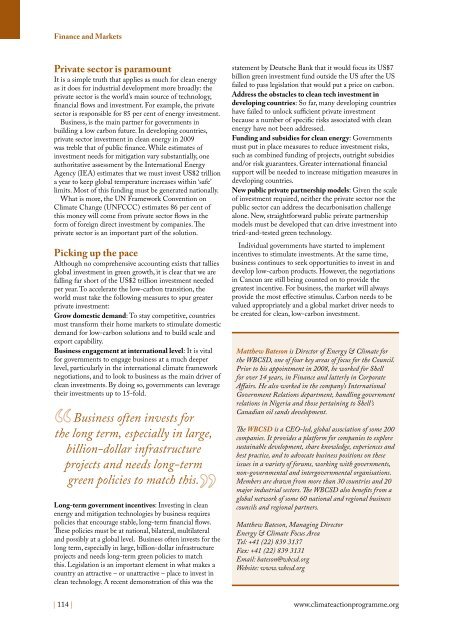Climate Action 2010-2011
Create successful ePaper yourself
Turn your PDF publications into a flip-book with our unique Google optimized e-Paper software.
Finance and Markets<br />
Private sector is paramount<br />
It is a simple truth that applies as much for clean energy<br />
as it does for industrial development more broadly: the<br />
private sector is the world’s main source of technology,<br />
financial flows and investment. For example, the private<br />
sector is responsible for 85 per cent of energy investment.<br />
Business, is the main partner for governments in<br />
building a low carbon future. In developing countries,<br />
private sector investment in clean energy in 2009<br />
was treble that of public finance. While estimates of<br />
investment needs for mitigation vary substantially, one<br />
authoritative assessment by the International Energy<br />
Agency (IEA) estimates that we must invest US$2 trillion<br />
a year to keep global temperature increases within ‘safe’<br />
limits. Most of this funding must be generated nationally.<br />
What is more, the UN Framework Convention on<br />
<strong>Climate</strong> Change (UNFCCC) estimates 86 per cent of<br />
this money will come from private sector flows in the<br />
form of foreign direct investment by companies. The<br />
private sector is an important part of the solution.<br />
Picking up the pace<br />
Although no comprehensive accounting exists that tallies<br />
global investment in green growth, it is clear that we are<br />
falling far short of the US$2 trillion investment needed<br />
per year. To accelerate the low-carbon transition, the<br />
world must take the following measures to spur greater<br />
private investment:<br />
Grow domestic demand: To stay competitive, countries<br />
must transform their home markets to stimulate domestic<br />
demand for low-carbon solutions and to build scale and<br />
export capability.<br />
Business engagement at international level: It is vital<br />
for governments to engage business at a much deeper<br />
level, particularly in the international climate framework<br />
negotiations, and to look to business as the main driver of<br />
clean investments. By doing so, governments can leverage<br />
their investments up to 15-fold.<br />
Business often invests for<br />
the long term, especially in large,<br />
billion-dollar infrastructure<br />
projects and needs long-term<br />
green policies to match this.<br />
Long-term government incentives: Investing in clean<br />
energy and mitigation technologies by business requires<br />
policies that encourage stable, long-term financial flows.<br />
These policies must be at national, bilateral, multilateral<br />
and possibly at a global level. Business often invests for the<br />
long term, especially in large, billion-dollar infrastructure<br />
projects and needs long-term green policies to match<br />
this. Legislation is an important element in what makes a<br />
country an attractive – or unattractive – place to invest in<br />
clean technology. A recent demonstration of this was the<br />
statement by Deutsche Bank that it would focus its US$7<br />
billion green investment fund outside the US after the US<br />
failed to pass legislation that would put a price on carbon.<br />
Address the obstacles to clean tech investment in<br />
developing countries: So far, many developing countries<br />
have failed to unlock sufficient private investment<br />
because a number of specific risks associated with clean<br />
energy have not been addressed.<br />
Funding and subsidies for clean energy: Governments<br />
must put in place measures to reduce investment risks,<br />
such as combined funding of projects, outright subsidies<br />
and/or risk guarantees. Greater international financial<br />
support will be needed to increase mitigation measures in<br />
developing countries.<br />
New public private partnership models: Given the scale<br />
of investment required, neither the private sector nor the<br />
public sector can address the decarbonisation challenge<br />
alone. New, straightforward public private partnership<br />
models must be developed that can drive investment into<br />
tried-and-tested green technology.<br />
Individual governments have started to implement<br />
incentives to stimulate investments. At the same time,<br />
business continues to seek opportunities to invest in and<br />
develop low-carbon products. However, the negotiations<br />
in Cancun are still being counted on to provide the<br />
greatest incentive. For business, the market will always<br />
provide the most effective stimulus. Carbon needs to be<br />
valued appropriately and a global market driver needs to<br />
be created for clean, low-carbon investment.<br />
Matthew Bateson is Director of Energy & <strong>Climate</strong> for<br />
the WBCSD, one of four key areas of focus for the Council.<br />
Prior to his appointment in 2008, he worked for Shell<br />
for over 14 years, in Finance and latterly in Corporate<br />
Affairs. He also worked in the company’s International<br />
Government Relations department, handling government<br />
relations in Nigeria and those pertaining to Shell’s<br />
Canadian oil sands development.<br />
The WBCSD is a CEO-led, global association of some 200<br />
companies. It provides a platform for companies to explore<br />
sustainable development, share knowledge, experiences and<br />
best practice, and to advocate business positions on these<br />
issues in a variety of forums, working with governments,<br />
non-governmental and intergovernmental organisations.<br />
Members are drawn from more than 30 countries and 20<br />
major industrial sectors. The WBCSD also benefits from a<br />
global network of some 60 national and regional business<br />
councils and regional partners.<br />
Matthew Bateson, Managing Director<br />
Energy & <strong>Climate</strong> Focus Area<br />
Tel: +41 (22) 839 3137<br />
Fax: +41 (22) 839 3131<br />
Email: bateson@wbcsd.org<br />
Website: www.wbcsd.org<br />
| 114 |<br />
www.climateactionprogramme.org












